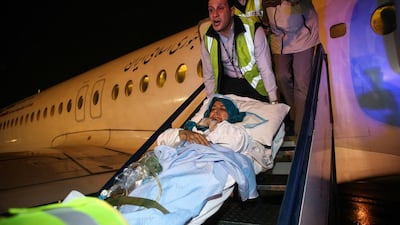BEIRUT // Thirty years after the Lebanese capital gave birth to the modern suicide bomber, a killer has again driven his explosive-packed car towards an embassy in Beirut, hurling charred corpses through the street.
For Lebanese, Tuesday’s carnage at the Iranian embassy - 23 people were killed and nearly 150 wounded - was both a sharp jolt from their own bloody past and a harrowing omen of a future as the Middle East’s next sectarian slaughterhouse.
Many Lebanese say they now believe their country is doomed to become the next battlefield for Sunni jihadists, looking for soft targets to inflict blows on the Shiite supporters of neighbouring Syria’s President Bashar Al Assad.
Lebanon has already been caught in the blowback from the 2 1/2-year-old civil war in Syria, with scores killed in clashes between Shiite Muslim supporters of Mr Al Assad and their Sunni foes.
But Tuesday’s suicide attack against the embassy of Shiite Iran, claimed by a Sunni militant group, took violence to a higher level. It resurrected the tactics born in a previous generation’s Lebanon war, which are now the signature of neighbouring states’ bloodbaths.
Shiites expressed the most fear.
“We expect a bloody conflict, more bombs,” said Ali Abbas, a Shiite poet attending a funeral in southern Beirut on Wednesday for four of the men killed in the attack. “This is a fight between the dark and the light, the night and the day,” he said. “They are present in Iraq, Syria and now Lebanon.”
Lebanon may “turn into a field of jihad - as the terrorist groups call it - as happened in Iraq and Syria,” said parliament speaker Nabih Berri, also a Shiite.
Other communities are also deeply worried. Lebanon’s anti-Assad March 14 coalition, which groups anti-Assad Sunni Muslims and Christians, laid blame with the Lebanese Shiite movement Hizbollah, saying it had provoked the violence by joining Syria’s war on Mr Al Assad’s behalf.
“There is a fear that Hizbollah’s continued intervention in Syria will lead to the Iraq-isation of Lebanon. They went to war in Syria and brought the war to Lebanon,” it said.
The Syrian war has polarised Lebanon and the wider Middle East between Sunnis and Shiites. Sunni Muslims support the rebels fighting the Assad regime and Shiites back the president, whose Alawite faith is an offshoot of Shiism.
This year, Mr Al Assad gained momentum by winning the overt battlefield support of Lebanon’s Hizbollah fighters, as well as help from Iraqi Shiites and Iranian commanders. Meanwhile Sunnis, including Lebanese, have poured into Syria to aid the rebels, who are armed and funded by Saudi Arabia and Qatar.
Beirut-based political commentator Rami Khouri said the “Armageddon scenario” - Iranian Shiite revolutionary forces facing off against Saudi-backed Sunni militants across the Middle East - was drawing rapidly closer.
“You have these two broad groups now openly attacking each other. It’s no longer a battle of proxies - the principles are killing each other in Lebanon, Syria and Iraq”.
The modern phenomenon of suicide bombing first blasted its way onto the world’s consciousness in April 1983, when a man drove a car packed with explosives into the US embassy in Beirut. The attack killed 63 people including 17 Americans.
Today, suicide bombing is the signature of Sunni groups, especially Al Qaeda’s Iraq branch, which has sent more than a thousand bombers to blow themselves up at markets, cafes, mosques and police checkpoints in the past decade. It has now joined forces with the Sunni rebels fighting in Syria.
Tuesday’s attack, the first major strike on an embassy in Beirut since Lebanon’s civil war, was claimed by a Lebanon-based Sunni Islamist militant group which warned of more attacks unless Tehran withdraws its military forces from Syria.
Amidst the anger and trepidation, the public responses from Iran and Hizbollah have been restrained. Hizbollah deputy leader Sheikh Naim Qassem called on all Lebanese “to stand together and face this terrorism, whatever our political differences”.
But privately, Shiite politicians described Tuesday’s bombing as a watershed. One said the use of suicide bombers had “changed the rules of the game” while another said Lebanon had been turned into a “jihadi battleground”.
“This bombing ups the ante,” said Paul Salem of the Middle East Institute, noting that previous rocket and bomb attacks earlier this year had targeted Hezbollah, not its patron Iran.
“Lebanon is part of a proxy war that is engulfing the entire Levant and the alliances that back the factions in Lebanon are the same that back opposing groups in Syria and Iraq,” he said.
“A pattern could evolve, as it did in Iraq in 2005-2006 and onward, in which car bombs and suicide missions were one of the main instruments of sectarian and proxy conflict.”
* Reuters

